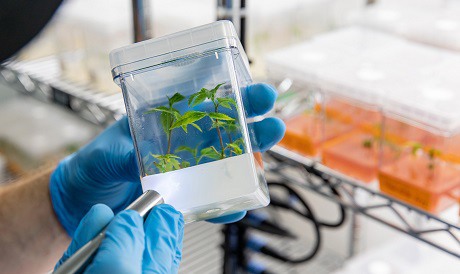CULTA has launched a tissue culture lab program. Often touted as the future of cannabis cultivation, tissue culture technology enables cultivators to reduce costs and improve the quality of their cannabis with consistent, disease-free, scalable cannabis clones.
"We took our first tissue culture clones on April 8th, but we have been planning this endeavor for two years," said CULTA Tissue Culture Lab Supervisor Isaac Fisher. "Right now, our primary goal is to culture our oldest and most popular strains, but ultimately we will have every CULTA strain growing in our Tissue Culture lab."
Tissue culturing has the unique ability to revitalize genetics that have lost vigor by resetting the epigenetics of the plants, which typically change after generations of traditional cloning methods. In addition, it allows cultivators to store all of their genetics in a small area and reduce the risk of pests without having to rely on chemicals.

For decades, tissue culture has been used for large-scale propagation in the agriculture industry, but the cannabis cultivation market is beginning to shift toward using the technology. "CULTA is the first cultivator in Maryland to have a tissue culture lab program, and the MMCC is basing some of their rules off CULTA's program. Not only does the lab act as a bank to back up their strains, but the program provides CULTA with the flexibility to rotate strains in and out of production without having to house or maintain large mother plants."
"Revitalizing and improving genetic vigor for sustained quality and performance is just our starting point," said Luke Batten, CULTA cultivation consultant. "Once we have the basics dialed in, this method of propagation will give us the ability to experiment with more advanced techniques."
Currently, CULTA has 26 different strains cultured, including Dosido 22-22, Poochie Love, Scooby Snacks #2, and others. CULTA expects to have all their genetics stored in the lab by the end of the year and hopes to start producing new mothers from tissue cultured plants within the next few months. Long term, CULTA plans on using the tissue culture lab for breeding purposes before moving onto more advanced applications of tissue culture.
"At CULTA, we're constantly looking for ways to innovate and take our genetics to the next level," said CULTA's Mackie Barch. "By culturing and storing all our genetics in a lab we'll be able to preserve CULTA's standout strains and can continue to provide our patients with the top tier cannabis they're accustomed to."
For more information: Culta
Culta
Tel: 844.507.9333
www.culta.io
